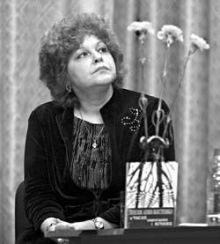The works of an artist — a poet (if we are talking about a personality of historical caliber) is always a magic mirror. Without it, it is impossible to perceive the time, drama, and tragedy of an epoch and yourself within this time. Our distinguished contemporary Lina Vasylivna Kostenko is this type of personality. We are just beginning to perceive the significance of everything that this writer has done for Ukrainian literature and our national self-consciousness.
However, even now, without the risk of falling into pathos, we can assert: we are all living in Kostenko’s epoch — whether we understand this or not. Perhaps only another personality of the 20th century can stand next to her — Lesia Ukrainka. These two unique creators, despite their absolute uniqueness, share something in common. Lina Kostenko is also a brilliant and consummate interpreter of Lesia Ukrainka’s works.
Kostenko’s works may be properly understood only within the context of the highest achievements of world literature and world literary thought. The authors of the new book The Poetry of Lina Kostenko in Transitional and Eternal Times (Kharkiv, Prapor Publishing House, 2006) have a keen understanding of this. This book is a collective work by many authoritative figures, including philologists and writers, such as Volodymyr Panchenko, Mykola Ilnytsky, Oxana Pachlowska, Liubov Holota, Volodymyr Morenets, Anatolii Yakovets, Dmytro Drozdovsky, and others. In their articles, scholarly studies, and journalistic essays they set themselves an extraordinarily difficult task: to reveal Kostenko’s “mystery” with the help of both scholarly philological methods and personal intuition.
This is possible only if we decipher the “code” of poetic art as such, analyzing the current level of our literature and culture — only then will the discussion be placed on a proper footing. Not wishing to “sugarcoat” the serious discussion, Dmytro Drozdovsky, the young but already acknowledged Ukrainian literary specialist and editor of the criticism department of the magazine Vsesvit (Universe) said that we are living in a “post-modern” society, in the society of “contemporary Ukrainian literature,” where the “dehumanization of the masses” (the phrase coined by Spanish philosopher Ortega y Gasset) is at full speed (or completed?). In the sphere of culture, this has resulted in a transformed-totalitarian canon of texts and their decoding. According to Drozdovsky, disengagement from Ukrainian history and literature is generating this crossbreed of contemporary society, which has become lost somewhere in historical timelessness.
In this connection, the well-known philologist and lecturer at National University of Kyiv-Mohyla Academy, Anatolii Yakovets, underlined that Kostenko’s works are a mighty emanation of resistance, striving for life, and freedom (not at all “a requiem for Ukraine” — we have enough of those).
Don’t entertain the thought,
That God will show His disfavor;
Human life is so short
There’s no time for defeat.
The audience listened with special attention to the paper presented by The Day’s regular contributor and daughter of Lina Kostenko, Oxana Pachlowska, who is a recognized philologist in Ukraine and abroad. She is a senior scholarly associate of the Shevchenko Institute of Ukraine’s National Academy of Sciences and professor at Rome University La Sapienza. Pachlowska focused attention on a unique feature of Kostenko’s personality: “The ability always to stand apart, to be herself under any circumstances, the ability to feel the right of choice, not asked for but given to herself — and the ability to start everything from the beginning again!”
The discussion topic as defined by Pachlowska was: what has happened to our society and why is poetry one of the keys to what is going on? “We are living not in a neo-democratic (this is an illusion) but in fact in a post-totalitarian society, moreover the totalitarian system in the USSR had no equal in the world because culture as such was being annihilated, the entire culture, not its individual elements. It was specifically the annihilation of culture that led to the creation of the continuum of vandalism, plebeianism, and cynicism; because the destruction of culture was a form of annihilation of the individual.” She admitted, however, that Ukraine has found the strength to resist, and the Maidan should be regarded within this context.
Disagreeing with some superficial analyses in the Western mass media, Pachlowska is convinced that “European Ukraine rose in revolt against the Soviet, Eurasian anti-Ukraine, it was not Ukrainian-speaking Ukraine that rose up against the Russian-speaking one.” Citing the terrible prediction of the American political scientist Samuel Huntington that the collision of the civilized and uncivilized world is awaiting humanity, and that “the breaking line” will be along the Dnipro River waterway, Pachlowska admitted that eschatological terms, as well as moods of apathy or euphoria, are not applicable to the situation in Ukraine.
The main alternative that will clarify the situation is the cultural level of the new generation. Kostenko’s role of “an invisible keeper of incalculable treasures” is a grand one. This is her own definition of the poet’s role. She is above all a poet, a creator. But Kostenko is “more than a Poet,” to quote the well-known line by Yevgeny Yevtushenko.








